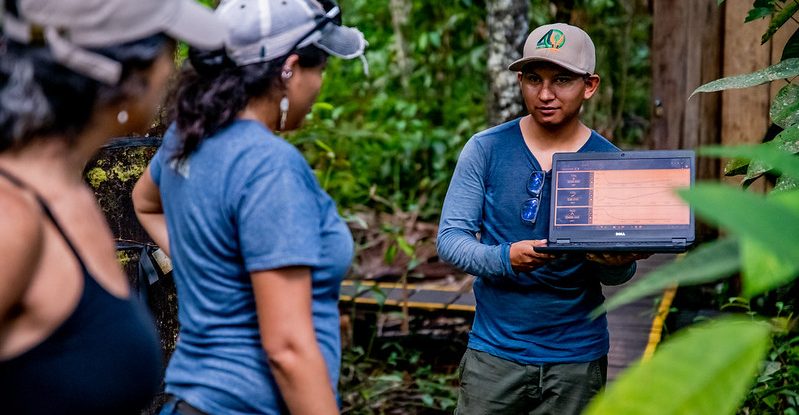When I joined the Center for International Forestry Research (CIFOR) in 1999, the organization was just six years old, with an interdisciplinary staff of 60 scientists and a mission to develop solutions to forest-related problems integrating both social and environmental concerns. Indonesia, CIFOR’s host country, became the world’s third-largest democracy that year and has continued to demonstrate leadership for forest landscapes throughout three decades of partnership.
Back then, international opinion was beginning to shift from a view of forests as mere ‘timber factories’ to one that recognizes their true value and potential to help meet multiple global goals. CIFOR always rejected the one-size-fits-all view of forestry. The principles that set it apart during its early days – that effective forest solutions must consider people’s needs (including those of women and marginalized groups), that policy must be informed not only by science but by input from stakeholders at multiple levels, and that strategies must take a holistic landscape approach informed by the local context – are now becoming mainstream.
Today, forests are widely recognized as complex ecosystems at the heart of watersheds, local livelihoods, food and nutrition security, biodiversity, and climate balance. Wetlands and mangroves – once considered wastelands that could comfortably be cleared for shrimp farms – are now understood as heavyweights of carbon storage, thanks in part to ground-breaking research by CIFOR. Trees can create oases of moisture and biodiversity in drylands and provide wildlife corridors through farmland. And the era of ‘fortress conservation’ is fading as more research demonstrates the critical contributions of Indigenous Peoples to biodiversity conservation, carbon sequestration, and landscape restoration.
CIFOR’s forest research has long seen beyond trees. Our global comparative research revealed the critical role forests play in local livelihoods, directly influencing how the World Bank conducts its Living Standard Measurement Study surveys. More recent research is revealing the critical importance of forests and wild foods in nutrition, including the sustainable use of wildlife. Our scientific evidence, analysis, and technical expertise have supported the development of national and subnational policies on forest management, the green economy, climate action, wetlands, and value chains, among other things. And from its humble roots in the first Forest Day at the 2007 UN climate conference in Bali, the Global Landscapes Forum (GLF) has evolved into the leading global movement on sustainable landscapes, connecting over 1.7 billion people so far, from youth leaders to large multilateral donors.
World Agroforestry (ICRAF) shares CIFOR’s holistic approach in its approach to agricultural landscapes. For over 40 years, ICRAF has aimed to find the balance between agriculture and environment, adopting the term ‘agroforestry’ to raise global recognition of the key role trees play on farms and emphasizing the need to base solutions on agroecological approaches that consider options by context.
When we decided in 2018 to merge the two organizations, some wondered why we didn’t join forces sooner – especially given that CIFOR began its life in ICRAF’s offices in Bogor, Indonesia. After a three-year merger process, our new organization CIFOR-ICRAF – fully united by the end of 2022 – brings a combined 75 years of expertise to its partnership network across 60 countries, with over 730 dedicated staff shaping global discussions through cutting-edge research findings and action on the ground. As part of the merger, we also launched Resilient Landscapes, an innovative venture that serves as an impact-driven bridge between science and business, finance, governments, and civil society. To date, we have completed over 2,200 projects worth more than USD 2 billion across 92 countries, and published over 25,000 research products – including through our suite of websites, news outlets, social media channels, and events.
This vast body of work has collectively highlighted the potential of forests, trees, and agroforestry to address global challenges like climate change and biodiversity loss, whilst shoring up food security and more sustainable livelihoods for many of the world’s most marginalized people. Working collaboratively with ministries, provincial and local governments, universities, communities, non-governmental organizations, women’s and Indigenous Peoples’ groups, and private companies has helped us to develop and promote ground-tested, locally-appropriate, and long-term solutions.
Colleagues have come and gone, but many have remained part of our core scientific team or stayed connected as associates, bringing their ever-diverse expertise to CIFOR-ICRAF’s global perspective. Several of our top scientists began at CIFOR as postdocs doing research in the Amazon, the Congo Basin, or remote parts of the Indonesian archipelago, and the local knowledge and insights they gained on the ground continue to inform CIFOR-ICRAF’s work supporting national efforts to meet global goals.
Now, we are beginning an exciting new chapter. Under a fresh leadership structure, incoming Chief Executive Officer Éliane Ubalijoro will lead CIFOR-ICRAF into an era of growth, as I assume a new role as Chief Operating Officer. Together, we are excited to accelerate our search for solutions – both those that have already been developed and tested by CIFOR-ICRAF and other research institutions, and those that will be co-created by the postdocs and young researchers to come, alongside local communities and our partners on the ground.
We want you to share Forests News content, which is licensed under Creative Commons Attribution-NonCommercial-ShareAlike 4.0 International (CC BY-NC-SA 4.0). This means you are free to redistribute our material for non-commercial purposes. All we ask is that you give Forests News appropriate credit and link to the original Forests News content, indicate if changes were made, and distribute your contributions under the same Creative Commons license. You must notify Forests News if you repost, reprint or reuse our materials by contacting forestsnews@cifor-icraf.org.
